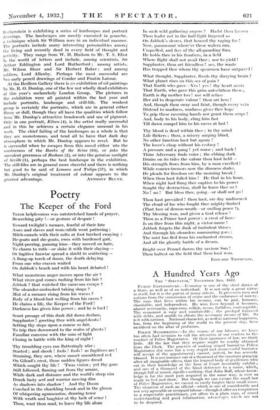A Hundred Years Ago
THE " SPECTATOR," NOVEMBER 31w, 1832.
PUBLIC EXPENDITURE.—Economy is one of the chief duties of a State, as well as of an individual. It is not only a groat virtue in itself, but it is the parent of many others. It preserves men and nations from the commission of crime and the endurance of misery. The man that lives within his income, can be just, humane, charitable, and independent. He who lives beyond it becomes, almost necessarily, rapacious, selfish, mean, faithless, contemptible. The economist is easy and comfortable; the prodigal harassed with debts, and unable to obtain the necessary means of life. So is it with nations. National character, as well as national happiness, has, from the beginning of the world to the present day, been sacrificed on the altar of profusion.
POLICE MAGIS.TRATES.—In the course Of Our labours, we have too often had occasion to call the attention of our readers to the conduct of Police Magistrates. Of their ignorance Of law, we think little. All the law that they require might be readily obtained from the Clerk. The practice of snaking stupid barristors Police Magistrates (for none but a very stupid and unsuccessful barrister will accept of the appointment) cannot, indeed, be too severely blamed. It is one instance out of a thousand of the constant grasping after all imaginable offices, that the learned body of gentlemen who eat in their knowledge at the Inns of Court invariably exhibit ; and one of a thousand of the blind deference to a name, which, though full of sound, signifies nothing, that John Bull, whose know. ledge is for the most part acquired in the same way, is ever so ready to feel and show. But though we can excuse the small law of Police Magistrates, we cannot so easily forgive their small sense. The situation of such an official—which Is one of considerable and not very agreeable or overpaid labour—though it offer no temptation to a respectable practitioner, yet offers to a plain man, of sound understanding and good information, advantages which are not to be despised.










































 Previous page
Previous page